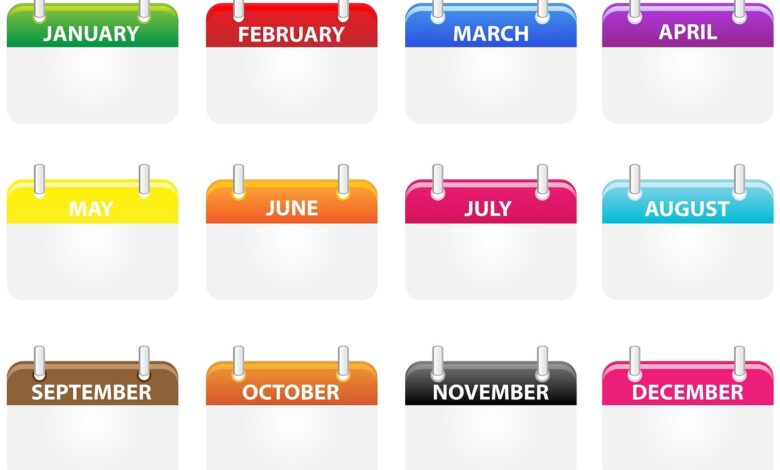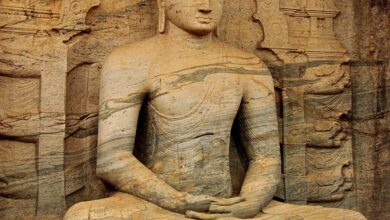Gujarati Calendar 2024: Calendar Events, Festivals 2024

The Gujarati Calendar 2024, a pivotal tool for the vibrant Gujarati community, plays a crucial role in shaping the cultural and religious fabric of their lives. This traditional calendar, deeply rooted in Hindu customs, serves as a comprehensive guide, seamlessly blending celestial events, festivals, and auspicious timings. As the year unfolds, the Gujarati Calendar not only marks the passage of time but also intricately weaves together the rich tapestry of rituals and celebrations that define the unique essence of Gujarati culture.
Gujarati Calendar 2024
The Gujarati Calendar for the year 2024 is a vital tool for individuals of the Gujarati community, serving as a comprehensive guide to the various cultural, religious, and auspicious events throughout the year. Rooted in tradition and closely tied to the Hindu lunar calendar, the Gujarati Calendar plays a crucial role in planning festivals, ceremonies, and other significant occasions.
- Lunar Influence: Similar to other Hindu calendars, the Gujarati Calendar is based on the phases of the moon. This lunar influence determines the dates of major festivals, fasting periods, and auspicious occasions.
- Festivals and Celebrations: The calendar meticulously outlines the dates of major festivals celebrated by the Gujarati community, including Diwali, Navratri, Makar Sankranti, and more. It serves as a reference for planning religious ceremonies and cultural events.
- Tithi and Nakshatra: The calendar provides detailed information about the Tithi (lunar day) and Nakshatra (lunar mansion) for each day. This information is crucial for determining the auspicious timings for various rituals and ceremonies.
- Panchang Elements: Users can find essential Panchang elements such as sunrise, sunset, moonrise, and moonset times, along with other astrological details. These elements contribute to the overall accuracy of the calendar for religious and cultural planning.
- Seasonal Observances: The Gujarati Calendar also incorporates seasonal observations, aligning with agricultural practices and traditions. This aspect reflects the close connection between the agricultural calendar and cultural festivities.
Gujarati Calendar Events
The Gujarati calendar, also known as the Vikram Samvat, is a traditional Hindu calendar widely followed in the Indian state of Gujarat. It is characterized by a unique set of events and festivals that hold cultural and religious significance.
| Event | Date | Significance |
|---|---|---|
| Uttarayan (Makar Sankranti) | January 14th | The festival marks the transition of the sun into the Northern Hemisphere. Celebrated with kite flying and special delicacies. |
| Navratri | Varies (twice a year) | A nine-night festival dedicated to Goddess Durga, involving dance (Garba and Dandiya) and fasting. |
| Diwali | Varies | The festival of lights celebrated with fervor, symbolizing the victory of light over darkness. |
| Raksha Bandhan | Varies | A day to celebrate the bond between brothers and sisters, where sisters tie a protective thread (rakhi) on their brothers’ wrists. |
| Janmashtami | Varies | Commemorating the birth of Lord Krishna, it involves fasting, singing, and midnight celebrations. |
| Holi | Varies | The festival of colors marks the arrival of spring, celebrated with enthusiasm and joy. |
These events reflect the rich cultural heritage and religious diversity of the Gujarati community, fostering a sense of unity and harmony among its people.
Hindu Festivals 2024
In 2024, Hindu festivals will continue to showcase the rich cultural tapestry and religious diversity of the Hindu community. These festivals, deeply rooted in tradition and spirituality, play a crucial role in connecting individuals with their faith and heritage.
- Holi (March 9-10, 2024):
- Known as the “Festival of Colors,” Holi marks the arrival of spring.
- Participants joyously engage in vibrant color play, symbolizing the triumph of good over evil.
- Rama Navami (April 2, 2024):
- Celebrated as Lord Rama’s birthday, devotees observe fasts and attend special prayers.
- Recitations of the Ramayana, an epic detailing Lord Rama’s life, are common during this festival.
- Diwali (October 24, 2024):
- Widely known as the “Festival of Lights,” Diwali symbolizes the triumph of light over darkness.
- Homes and public spaces are adorned with lamps, candles, and fireworks, and families come together to share festive meals.
- Navaratri (September 25 – October 3, 2024):
- A nine-night celebration dedicated to the goddess Durga, symbolizing the victory of good over evil.
- Each night, different forms of the goddess are worshipped, and traditional dance forms like Garba and Dandiya are performed.
- Ganesh Chaturthi (August 29, 2024):
- Honoring Lord Ganesha, the elephant-headed deity, this festival involves the installation of Ganesha idols in homes and public spaces.
- The festival concludes with the immersion of the idols in water, symbolizing the cycle of creation and dissolution.
- Krishna Janmashtami (August 12, 2024):
- Celebrated as the birth anniversary of Lord Krishna, devotees observe fasts, sing devotional songs, and participate in dance dramas depicting Krishna’s life.
- Dahi Handi, the breaking of a pot filled with curd, is a popular and lively tradition during this festival.
These Hindu festivals in 2024 will not only foster a sense of community but also provide individuals with opportunities for spiritual reflection, cultural expression, and joyous celebrations.
Gujarati Panchang 2024
The Gujarati Panchang for the year 2024 serves as a comprehensive astrological and cultural guide for the Gujarati community. It is a traditional Hindu calendar followed in the state of Gujarat, India, and is crucial for planning auspicious events, festivals, and rituals.
| Month | Tithis (Lunar Days) | Festivals and Observances |
|---|---|---|
| January | Pratipada, Panchami, Ekadashi, Purnima | Uttarayan, Vasant Panchami |
| February | Tritiya, Saptami, Trayodashi, Amavasya | Maha Shivaratri |
| March | Chaturthi, Navami, Dwadashi, Purnima | Holi |
| April | Panchami, Dashami, Trayodashi, Amavasya | Chaitra Navratri |
| May | Saptami, Ekadashi, Purnima | Akshaya Tritiya |
| June | Ashtami, Trayodashi, Purnima | Nirjala Ekadashi |
| July | Navami, Purnima | Guru Purnima |
| August | Ekadashi, Dwadashi, Amavasya | Shravana Month, Raksha Bandhan |
| September | Tritiya, Saptami, Trayodashi, Purnima | Ganesh Chaturthi |
| October | Chaturthi, Navami, Dwadashi, Amavasya | Navratri, Dussehra |
| November | Panchami, Dashami, Trayodashi, Purnima | Diwali |
| December | Saptami, Ekadashi, Purnima | Kartik Purnima, Vivah Panchami |
The Panchang also provides information about the auspicious and inauspicious timings (Muhurat) for various activities such as weddings, housewarming ceremonies, and other significant life events.
Indian Calendar in The USA
The Indian calendar, deeply rooted in the country’s rich cultural and religious traditions, has found a place of significance even in the United States. As a diverse nation, the USA embraces various cultures, and the Indian community has brought its unique calendar system along with its festivals and observances.
Use in Cultural Celebrations: The Indian calendar, often referred to as the Hindu calendar, is lunar-based and encompasses a series of festivals and events. Diwali, Holi, Navratri, and other celebrations are marked according to this calendar, allowing the Indian diaspora in the USA to maintain a connection with their cultural and religious heritage.
Religious Observances: Many Indian Americans adhere to their religious practices based on the Indian calendar. The timing of auspicious days, fasting periods, and religious ceremonies is determined by this calendar, providing a sense of continuity with traditions practiced in India.
Community Events and Gatherings: Community organizations and cultural groups often organize events and gatherings aligned with the Indian calendar. These occasions serve as platforms for fostering a sense of community, promoting cultural exchange, and celebrating shared values and traditions.
Impact on Business and Work: For individuals following the Indian calendar, certain days hold special significance, influencing business decisions and work schedules. Awareness and accommodation of these cultural practices contribute to a more inclusive and understanding work environment.




I recently checked out the Gujarati Calendar for 2024 and I’m really impressed with its detailed presentation of festivals and holidays specific to the Gujarati culture. It’s a great resource for anyone interested in understanding and celebrating Gujarati traditions.